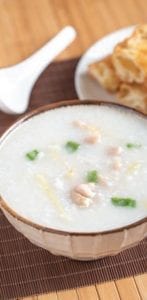Due to today’s fraught political climate and frenzied pace of life, Americans are experiencing increased levels of worry and stress. The New York Times recently reported that “in the United States, about 55 percent of adults said they had experienced stress during ‘a lot of the day’ prior, compared with just 35 percent globally. Statistically, that put the country on par with Greece, which had led the rankings on stress since 2012.” 1
As physicians of Asian medicine, we are aware of the epidemic levels of digestive distress. We understand the strain this cultural climate has put upon on our digestion, but we also provide treatment that reduces stress and protects the spleen against the detrimental effects of so much worrying. To meet the demands of today, our remedy must be quick, easy, convenient, and accessible. But it must also be warm, whole, slow, soothing, healing, and agreeable to the average person. The solution is thousands of years old, and it’s been in our doctor’s bag all along.
Congee is that simple wisdom; that ancient elixir. A traditional Asian rice porridge that’s been around since the time of the Buddha, this medicinal meal benefits the stomach and intestines and is excellent for digestion. Slow-cooked with lots of water, congee is exceptional at hydrating, often fed to babies, nursing mothers, or the ill and depleted. This simple porridge easily delivers needed nutrients to those with compromised digestion, while simultaneously healing and repairing the organs and associated channels.
Integrating Congee into Daily Wellness Practices
In my practice, congee is the first line of defense for patients who suffer from loose stools or constipation of any type. It regulates and balances, working equally well for both dry and damp conditions. The benefits extend far beyond discomfort in the abdomen or epigastrium. Strengthening qi and yang, nourishing yin, building blood, and calming shen must be part of a daily routine.
From surveying my patients over the decades, I have come to believe that breakfast is the meal most likely to damage spleen qi and yang. Cold smoothies and granola bars on the run are not the nourishment our bodies need. I know congee offers a nourishing alternative because I’ve been eating it for breakfast for 27 years.
When my beloved mother passed away from complications of constipation, my calling became crystal clear: to bring the simple, healing power of congee to my home country and the West. Breakfast Cure was born.
My mission is two-fold: make it so easy that success is guaranteed, and create recipes that delight the Western palate. Congee is convenient because it cooks overnight while you sleep. It offers a warm, well-cooked, homemade meal that is ready when you wake up and easy to digest and absorb. It dawned on me that a pre-packaged, easy-to-make, high-quality congee might also be the key to compliance. I was right.
The prospect of making congee from scratch is often daunting and congee packets can be training wheels that allow patients to see, taste, and feel what is possible. Some will be inspired to create their own personalized recipes, while others will be relieved to have pre-packaged options. Either way, the key to my Breakfast Cure method is to slow-cook the congee overnight while you sleep, eliminating morning stress from deciding, prepping, and cooking.
When this message came in recently I was thrilled—one more person blown away by the power of a simple old porridge:
“Hi Karen. I wanted to let you know that I made the Fig Cardamom Congee and ate it with the pistachios. It was divine! I don’t know how I’ve lived without it until now. I’m not bloated or uncomfortable at all. I will make one of the other flavors on Sunday night.”
Then another update:
“I still feel great. It was exactly as you said it would be, but it was still surprising to me. The congee is strangely comforting, and eating it makes me feel like I’m doing something profoundly good for my health. It’s nourishing in a deep, spiritual way. Breakfast Cure certainly lives up to its name. ❤️ Thank you!”
My passion redoubles upon receiving a glowing report like this one. I share it with you here to emphasize that it doesn’t have to take a long time. It is as powerful as it is simple. Love your spleen, and make it a daily routine.
Are you interested in becoming a certified acupuncture professional?
Visit the links below to explore our specialized acupuncture programs at a campus near you:
Promoting Congee for Comprehensive Health and Wellness
Congee works because it presents no challenges to a weak digestive system. There is nothing raw, cold, hard, dry, or difficult to digest after cooking with five or more times the volume of water at a low temperature for 8 to 14 hours. Breakfast Cure recipes emphasize organic, gluten-free whole grains and a wide variety of ingredients, which is one of the keys to good nutrition.
Congee Recipes Tailored for Specific Health Needs
Traditional recipes, as well as Breakfast Cure flavors, target specific patterns. For example, The Book of Jook’s basic congee recipe for a malnourished patient is made from white rice and water and served with butter and honey. Many people are surprised to learn that white rice is best in some cases: it is soothing and easy to digest. I love introducing people to a truly whole oat groat and the delicious congee it makes. I created Apple Cinnamon Breakfast Cure as a way to introduce people to congee using a flavor already popular for breakfast, yet made with a grain so complete it requires a much longer cook time. 2
One of my recipes, Masala Chai Spice, I call a quintessential modern congee because it is a soothing qi and yang tonic made primarily of white rice. I formulated Mega Omega, a more complex flavor, to nourish yin and clear false heat. I recently introduced my first true culinary medicinal flavor: Red Mushroom Medley. Drawing on the benefits of Wuyi mushrooms to nourish blood, it also contains Da Zao (jujubes) and longan fruit. Scallions, ginger, shiitake mushrooms, and red rice round out this Chinese herbal offering. The results are in: this savory, Chinese herbal flavor rivals my other top recipes in popularity. This is a significant milestone: Americans are finally ready to love our congee mornings.
The Future of Congee in Western Health Culture
It is my personal mission to hear “congee” uttered as a common household word, just as I have witnessed with “acupuncture” during my career. When I started acupuncture school, needles were still considered experimental by the FDA. When I began my practice in 1995, I spent most of my days educating patients about acupuncture. Most people had never heard of it and didn’t know anyone who had tried it.
We are the ones who can bring congee and all its healing powers to the people around us. As acupuncturists, we understand why it is genuinely good for everyone. We are not part of the bandwagon mentality, judging a food group the “bad” food of the decade. Meat was bad for you in the 80s, fat was unacceptable in the 90s, and today grains are the demonized food. Chinese medicine provides us a vantage point that allows us to see beyond trendy fads and draw instead upon our beautiful, time-tested traditions.
The pioneers among us who brought our medicine to the West, like Bob Flaws, shared so much wisdom with early acupuncturists here. The Book of Jook, first published the year I graduated from Southwest Acupuncture College, was an early English-language resource that opened the path for us to embrace this healing medicinal porridge. The book’s tagline even suggests congee as a “healthy alternative to the typical Western breakfast.” 3
I imagine that, like me, many among us have tried and failed to get patients to make congee at home. Compliance is the key as well as the greatest challenge. I had the same issue when I first started my practice with a full, loose-herb pharmacy. Now we have the option of so many easy-to-take, high-quality Chinese herbal formulas that compliance isn’t much of a barrier.
As acupuncturists, we know that the concept of spleen yang and our theory of digestion are often difficult for our patients to fully understand. The immediate, tangible, soothing effect of eating congee first thing in the morning, coupled with the deeper long-term benefits, allow patients to experience this abstract theory through personal experience. They feel good!
I sleep better knowing that I’m following the teachings of the ancient masters by turning first to tools of diet and lifestyle. Congee and Breakfast Cure have allowed me to share these tools with others in a way that will reduce stress, nourish, and heal. I invite you to try it.
References:
- Chokshi, Niraj, The New York Times, Americans Are Among the Most Stressed People in the World, April 25, 2019.
- Flaws, Bob, The Book of Jook, Blue Poppy Press, 1995, p. 58.
- Flaws, Bob, The Book of Jook, Blue Poppy Press, 1995.
Featured Posts:

